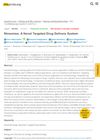2 citations,
December 2021 in “Pharmaceutics” Finasteride-loaded proniosomes effectively promote hair growth in mice.
1 citations,
December 2023 in “Nanomaterials” Combining specific nanoparticles with immune therapy significantly improves cancer treatment.
1 citations,
February 2023 in “Applied sciences” The new topical growth hormone formula has high skin penetration and bioavailability.
[object Object] 1 citations,
February 2023 in “Pharmaceutics” New UVA-responsive nanocapsules effectively kill microorganisms in hair follicles when activated by light.
1 citations,
December 2022 in “Bioactive Materials” The microneedle patch with quercetin, zinc, and copper effectively promotes hair regrowth for androgenic alopecia.
1 citations,
November 2022 in “Aaps Pharmscitech” 1 citations,
August 2022 in “BioMed Research International” Chitosan-decorated nanoparticles can improve skin delivery and reduce side effects of finasteride.
 1 citations,
May 2022 in “Pharmaceutics”
1 citations,
May 2022 in “Pharmaceutics” Tea seed oil in nanostructured carriers stimulates hair growth and feels less greasy when applied.
January 2025 in “Cosmetics” Exosomes could improve skin care, but more research is needed to confirm their safety and effectiveness.
Current hair regeneration methods show promise but face challenges in maintaining cell effectiveness and creating the right environment for hair growth.

Nanoformulations improve luteolin's effectiveness as a cancer treatment.

Hair RiseTM microemulsion effectively promotes hair growth and treats hair loss better than standard treatments.
 August 2024 in “Stem Cell Research & Therapy”
August 2024 in “Stem Cell Research & Therapy” New regenerative therapies show promise for treating hair loss.
June 2024 in “Regenerative Therapy” Exosomes from stem cells may help rejuvenate skin and regrow hair, but more research is needed.
 April 2024 in “Bioactive materials”
April 2024 in “Bioactive materials” New microneedle treatment with growth factors and a hair loss drug shows better and faster hair growth results than current treatments.
April 2024 in “Cosmetics” Microneedling improves skin and hair conditions by enhancing treatment absorption and stimulating growth factors.
March 2024 in “Biomedicines” Mesenchymal stem cells show promise for effective skin repair and regeneration.
 March 2024 in “International journal of pharmaceutics. X”
March 2024 in “International journal of pharmaceutics. X” Spanlastic-laden nanogel could be a better way to deliver hair growth medication through the skin for treating hair loss.
 March 2024 in “Bioactive Materials”
March 2024 in “Bioactive Materials” New treatment using engineered nanovesicles in hydrogel improves hair growth by repairing hair follicle cells in a mouse model of hair loss.
 November 2023 in “Advanced functional materials”
November 2023 in “Advanced functional materials” Magnesium Silicate Sprays help heal burn wounds and regrow skin features better than commercial products.
 November 2023 in “ACS Omega”
November 2023 in “ACS Omega” New liposome treatment successfully delivers CRISPR to deactivate a key enzyme in androgen-related disorders.

Nanocarriers with plant extracts show promise for safe and effective hair growth treatment.
October 2023 in “International journal of molecular sciences” Key proteins and pathways regulate wool fiber diameter in Alpine Merino sheep.
 October 2023 in “Biomaterials”
October 2023 in “Biomaterials” Nanotechnology could improve hair regrowth but faces challenges like complexity and safety concerns.

Peptide hydrogels show promise for healing skin, bone, and nerves but need improvement in stability and compatibility.

Garlic can help hair grow by activating certain growth pathways, and it works whether you eat it or apply it to your scalp.
65 citations,
October 2015 in “Acta Biomaterialia” The nano-carrier makes etoposide safer and more effective against lung cancer.
 3 citations,
December 2021
3 citations,
December 2021 Niosomes are a promising method for delivering drugs directly to targeted areas in the body.
[object Object]  39 citations,
January 2019 in “Journal of Dermatological Treatment”
39 citations,
January 2019 in “Journal of Dermatological Treatment” Ketoconazole cream is effective for skin conditions like seborrheic dermatitis and may help with hair loss and other skin issues, with generally mild side effects.
 3 citations,
February 2023 in “Journal of drug delivery science and technology”
3 citations,
February 2023 in “Journal of drug delivery science and technology” The new drug carriers show promise for better targeting and treating ovarian cancer.















